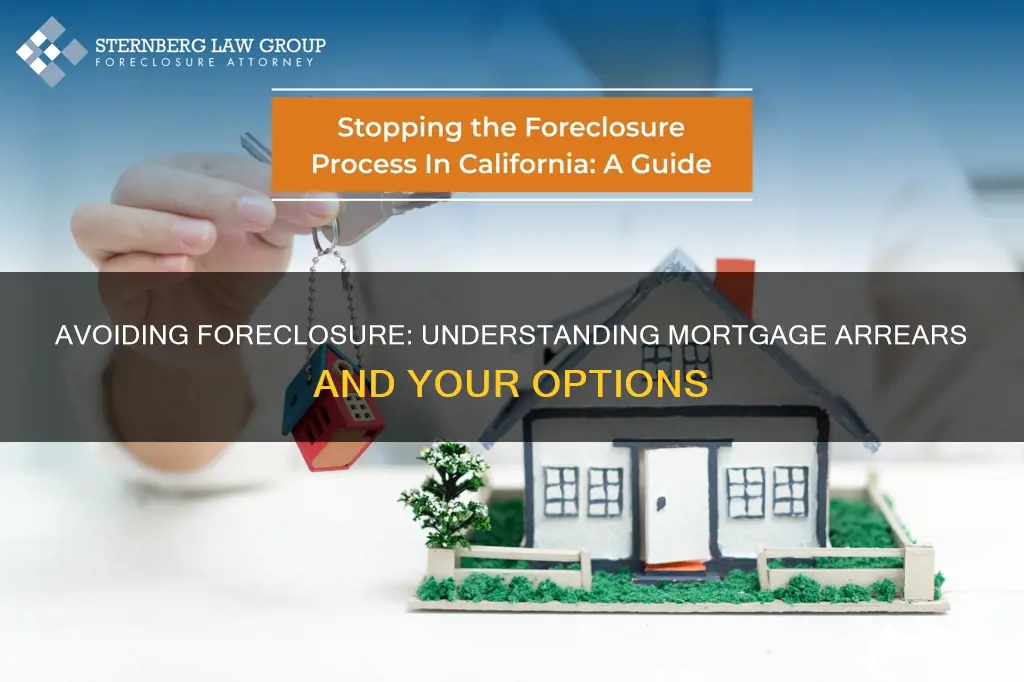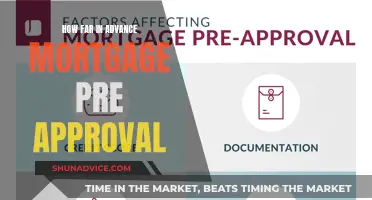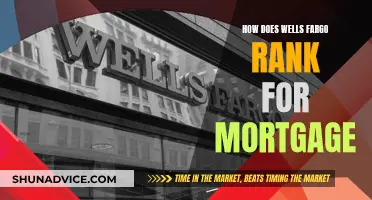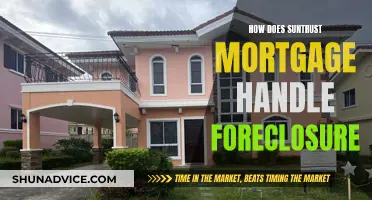
Foreclosure is a messy, time-consuming, and costly process for both the lender and the borrower. While the laws and regulations surrounding the process vary by state and jurisdiction, the foreclosure process generally cannot start until a borrower is at least 120 days or three to four consecutive monthly payments behind on their mortgage. Once the process begins, the amount of time until an actual foreclosure sale varies by state.
What You'll Learn
- Foreclosure typically begins after three to four missed payments
- The foreclosure process can vary by state and jurisdiction
- Lenders will notify you before foreclosure and may work with you to avoid it
- You can be delinquent by 120 days before the foreclosure process begins
- Foreclosure can be costly and time-consuming for lenders

Foreclosure typically begins after three to four missed payments
Foreclosure is a messy, time-consuming, and costly process for both the lender and the borrower. As such, foreclosure typically begins after three to four missed payments, or 90 to 120 days. After 90 days of missed payments, the lender will file an official notice of default and a lis pendens, which indicates that a lawsuit relating to your property may be pending. This is usually sent by certified mail or posted on your front door, and it is also filed with your local recorder's office.
After your first skipped payment, the servicer can charge a late fee to your account, usually between 4% and 6% of the payment amount, but only after the grace period has expired. The grace period is typically between 10 and 15 days. Each month you don’t pay, you’ll rack up another late charge. After the grace period, the lender may also report you to the credit bureaus, which will harm your credit score.
After 120 days of missed payments, the lender can begin the pre-foreclosure process. At this point, the lender places a lien on the property and can force you to vacate. However, it's important to note that the timeline and procedures for foreclosure can vary depending on the state, jurisdiction, and the local housing market. For example, in some jurisdictions, a policy known as the right of redemption gives foreclosed homeowners a year or more to buy back their property after foreclosure by paying more than the high bidder at a foreclosure auction. Therefore, it's important to consult with a foreclosure lawyer or a HUD-approved housing counselor to understand the specific laws and options available in your area.
Understanding Mortgage Escrow: Accounts, Payments, and Zero Balance
You may want to see also

The foreclosure process can vary by state and jurisdiction
Once the foreclosure process begins, the timeline for each subsequent step can depend on state and local laws. After your third missed payment, your lender may send a demand letter stating the amount you owe, and you will typically have 30 days to bring your payments up to date. As the process moves forward, you will start incurring fees, and your lender's attorneys may become involved. After your fourth missed payment, the lender's attorneys may proceed with a foreclosure sale, and you will receive a notice of this sale in accordance with state and local laws. The time between this notice and the actual sale can vary, but it is often as short as two to three months.
The sale of the property marks the official foreclosure, and the method of foreclosure can also differ based on state law. In a judicial foreclosure, the lender must file a suit in court, and if the borrower cannot pay within 30 days, the property is auctioned. Following the sale, there is often a redemption period during which the previous homeowner can attempt to buy back the property by paying more than the high bidder at the auction. The length of this redemption period varies, and in some cases, the former homeowner may be allowed to stay in the house during this time.
It is important to note that communication with your lender or loan servicer is crucial throughout this process. Lenders often prefer to avoid foreclosure due to its costly and time-consuming nature, and they may be willing to work with you to find alternative solutions. Additionally, seeking guidance from a HUD-approved housing counseling agency or a HUD housing counselor can help you explore options to avoid foreclosure.
Renewing Your Mortgage Early: Is It Worthwhile?
You may want to see also

Lenders will notify you before foreclosure and may work with you to avoid it
Foreclosure is a rigorous legal process that no lender wants to go through. It is time-consuming and costly for both the borrower and the lender. Therefore, lenders will notify you before foreclosure and may work with you to avoid it.
If you know you are going to miss a mortgage payment, reach out to your mortgage company proactively to discuss loss mitigation options. For example, you may be able to work out a forbearance plan with your mortgage company, which would allow you to temporarily pause making mortgage payments. If you are worried about the possibility of foreclosure, you can contact a housing counsellor. Housing counsellors can help homeowners review their finances and evaluate their options to prevent the loss of their home.
Your loan servicer is the company that handles your mortgage account, and it may or may not be the company that either issued or currently owns the loan. The loan servicer must contact you (or try to do so) by phone to talk about "loss mitigation" no later than 36 days after your first missed payment and within 36 days of any subsequent missed payments. Within 45 days of a missed payment, your servicer must notify you in writing about your loss mitigation options and refer you to someone who can help you try to avoid foreclosure.
In general, your servicer cannot start to foreclose until you are at least 120 days behind on your payments. Foreclosure notices are sent through the mail. If you're behind on your mortgage, read your mail carefully, and be sure to pick up any certified or registered mail. You will likely receive a letter or phone call from your mortgage company after your first missed payment. After your third missed payment, your lender can send a demand letter that states how much you owe. At this point, you have 30 days to bring your mortgage payments up to date. As the foreclosure process moves forward, you will be contacted by your lender's attorneys and begin to incur fees. After your fourth missed payment, your lender's attorneys may move forward with a foreclosure sale. You will receive a notice of the sale in accordance with state and local laws. The amount of time between receiving the notice of the trustee's sale and the actual sale will depend on state laws.
Comparing Your Mortgage: How Does it Stack Up?
You may want to see also

You can be delinquent by 120 days before the foreclosure process begins
Foreclosure is a messy, time-consuming, and costly process for both the lender and the borrower. Lenders generally prefer to avoid foreclosure and would rather work with you to find a solution. You can be delinquent by 120 days, or about four months, before the foreclosure process begins. This means that you can miss no more than three consecutive monthly mortgage payments before you're at risk of foreclosure.
Federal law requires lenders to wait at least 120 days before officially starting the foreclosure process. This is known as the 120-day foreclosure restriction and it applies to both payment-related and non-payment-related breaches of the mortgage contract. Non-payment breaches include failing to maintain homeowners' insurance, violating the law while on the property, and not occupying the home when the mortgage requires it.
After 90 days without payment, your lender will likely send you a notice of default or breach letter, informing you of the default and providing a deadline to catch up on payments. After a total of four missed payments, or 120 days after your first missed payment, the lender places a lien on the property and can force you to vacate. However, the timeline may vary depending on your state and local jurisdiction, as well as the state of the housing market in your area.
If you are having trouble making your mortgage payments, it is important to act quickly. Contact your lender or loan servicer to discuss your options and try to work out a plan to avoid foreclosure. You can also reach out to a HUD-approved housing counseling agency to get free expert assistance on avoiding foreclosure.
Freedom From Mortgage: A Dream Come True
You may want to see also

Foreclosure can be costly and time-consuming for lenders
Foreclosure is typically triggered after a borrower misses three payments, which is 90 days past due on their mortgage. After the fourth missed payment, the lender places a lien on the property and can force the borrower to vacate. However, the foreclosure process can be lengthy and vary depending on the state and jurisdiction, with some instances of people missing several monthly payments before losing their homes. This process can be costly and time-consuming for lenders, who may be willing to settle the matter on reasonable financial terms.
The foreclosure process can be broken down into several phases. After the first 30 days of a missed mortgage payment, the loan is considered in default, and the lender must contact the borrower in writing and provide information about their options. After the third missed payment, the lender can send a demand letter stating how much the borrower owes, and the borrower has 30 days to bring their payments up to date. If the borrower still cannot make their payments within 30 days, the lender can file a Notice of Sale, and the property will be placed up for auction. The amount of time between receiving the notice of sale and the actual sale depends on state laws and can be as quick as two to three months.
The exact foreclosure process differs depending on the state and whether it is a judicial or non-judicial foreclosure. In a judicial foreclosure, the lender must file a lawsuit against the property and its owner, serve the defendant, and go through a court motion to get the title (ownership) of the property. This process can last a few months or several years. In contrast, a non-judicial foreclosure does not require the lender to file a lawsuit, as they can pursue foreclosure with the help of a third-party trustee. This process can be completed in a few months since it does not require the lender to go through a court process to gain ownership of the property.
Lenders generally prefer to avoid foreclosure because it is costly and time-consuming. Instead, they may offer loan modifications or payment plans to help borrowers stay in their homes. Therefore, it is essential for borrowers to communicate transparently with their lenders and seek assistance from housing counselors or foreclosure defense attorneys to understand their options and rights.
Gifts, Mortgages, and Parental Money: Impact and Insights
You may want to see also
Frequently asked questions
Generally, a lender can begin foreclosure proceedings after you miss four consecutive mortgage payments, or 120 days after your first missed payment. However, this can vary depending on the state and the jurisdiction.
If you miss a mortgage payment, you will likely be contacted by your lender, but it is unlikely that your home will be foreclosed right away. You will be charged a late fee, usually between 4% and 6% of the payment amount, after the grace period expires.
The grace period is usually between 10 and 15 days. Payments submitted within this time are usually accepted without penalty.
If you are having trouble making your mortgage payments, it is important to act quickly. Contact your mortgage servicer to discuss your options and find out if there are any programs available to help you avoid foreclosure. You can also contact a HUD-approved housing counseling agency for free expert assistance.







